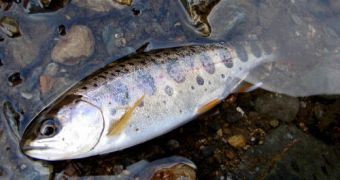The news just broke that a group of Japanese researchers succeeded in breeding a species of salmon indigenous to their country with the help of surrogates belonging to other species.
Their findings were published in the latest issue of the journal Proceedings of the National Academy of Sciences of the United States of America, and the scientists hope that the methodology they perfected while breeding these salmons in this peculiar manner will eventually help protect endangered species.
In order to breed the yamame salmons taken into consideration for this study with the help of surrogates, the researchers had to extract primordial germ cells (i.e. spermatogonia) from the frozen testes of such fish, Japan Daily Press reports.
Later on, these primordial germ cells were implanted in sterile rainbow trout hatchlings.
Once inside the body of these trouts, said cells allowed the fish to grow either sperm or egg cells, which were collected and made to fuse with one another to produce a brand new and surprisingly healthy yamame salmon.
“I would like to make a bank of reproductive cells of the world's endangered fish, and we would store them until rivers became healthy environments again, after which we would raise the fish and release them,” Professor Goro Yoshizaki from the Tokyo University of Marine Science and Technology told members of the press.
According to the same source, the researchers wish to continue experimenting with this methodology over the course of the following years.
It is their hope that, in the not so distant future, they will succeed in breeding amphibians and reptiles in this manner.
Eventually, the methodology could be used to help various species of mammals whose population has declined to a considerable extent over the past few decades.
Still, given the fact that the genetic and biological makeup of mammals is a tad more complex than that of amphibians and reptiles, it may be a while before the general public is presented with such a scientific breakthrough.

 14 DAY TRIAL //
14 DAY TRIAL //